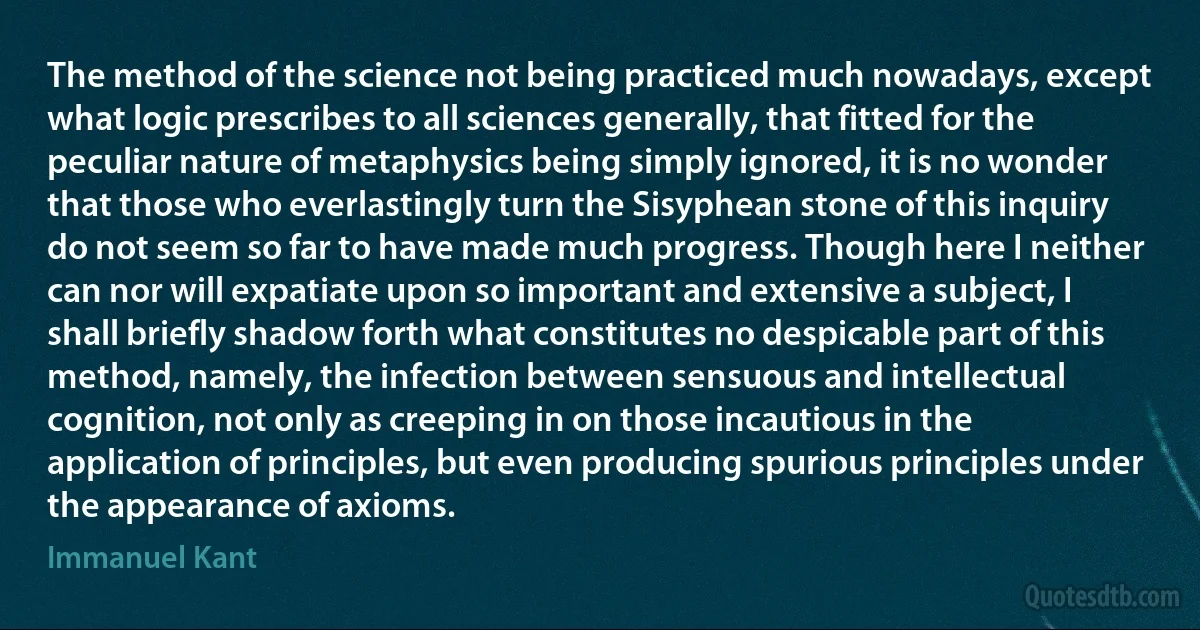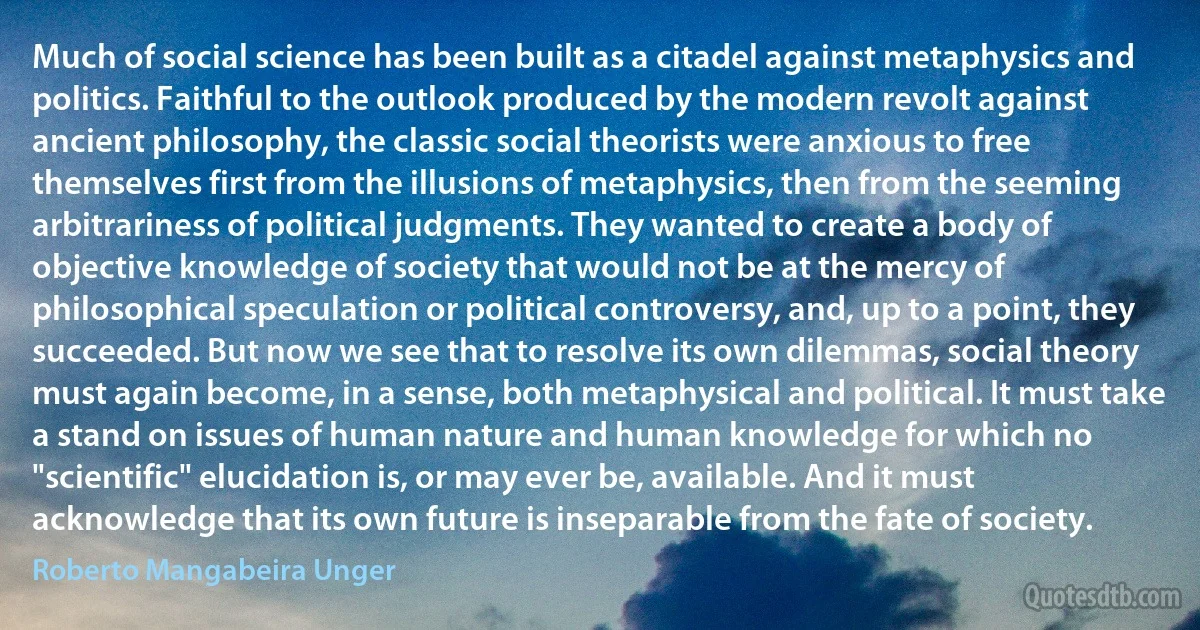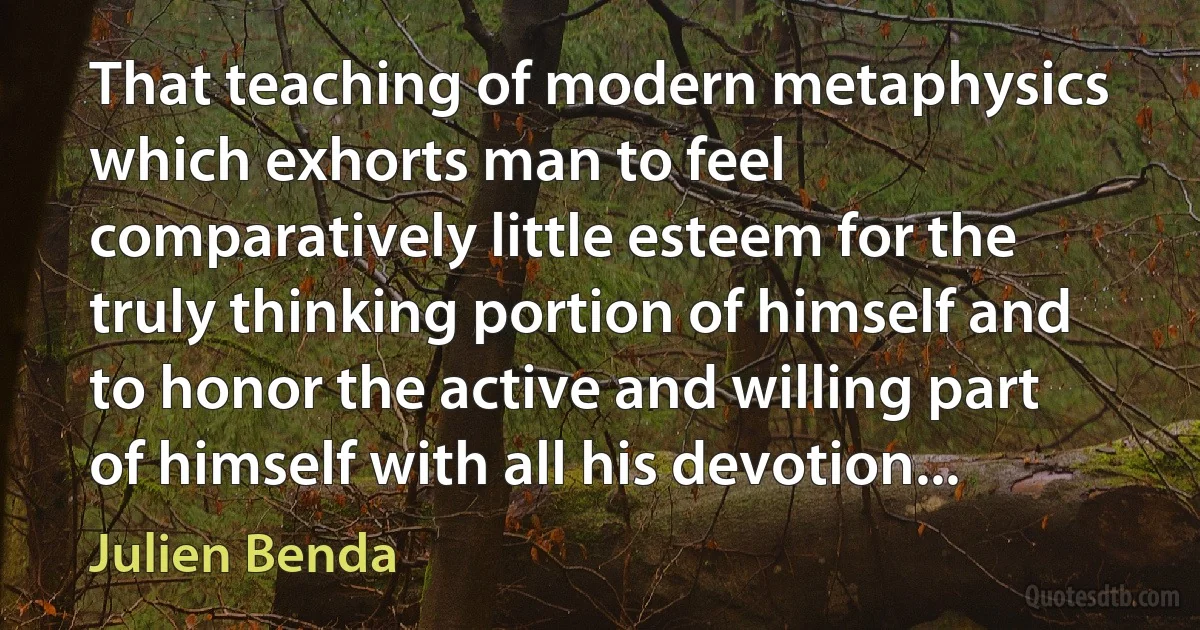Metaphysics Quotes - page 5
The use of the intellect in the sciences whose primitive concepts as well as axioms are given by sensuous intuition is only logical, that is, by it we only subordinate cognitions to one another according to their relative universality conformably to the principle of contradiction, phenomena to more general phenomena, and consequences of pure intuition to intuitive axioms. But in pure philosophy, such as metaphysics, in which the use of the intellect in respect to principles is real, that is to say, where the primary concept of things and relations and the very axioms are given originally by the pure intellect itself, and not being intuitions do not enjoy immunity from error, the method precedes the whole science, and whatever is attempted before its precepts are thoroughly discussed and firmly established is looked upon as rashly conceived and to be rejected among vain instances of mental playfulness.

Immanuel Kant
The sensuous may be exceedingly distinct, while intellectual concepts are extremely confused. The former we observe in the prototype of sensuous knowledge geometry; the latter, in the organon of all intellectual concepts, metaphysics. It is evident how much toil the latter is expending to dispel the fogs of confusion darkening the common intellect, though not always with the happy success of the former science.

Immanuel Kant
All true metaphysics is taken from the essential nature of the thinking faculty itself, and therefore in nowise invented, since it is not borrowed from experience, but contains the pure operations of thought, that is, conceptions and principles à priori, which the manifold of empirical presentations first of all brings into legitimate connection, by which it can become empirical knowledge, i.e. experience. ...mathematical physicists were thus quite unable to dispense with such metaphysical principles...

Immanuel Kant
Isaac Newton deserves to be included in a series of companions to major philosophers even though he was not a philosopher in the sense in which Descartes, Locke, and Kant were philosophers. That is, Newton made no direct contributions to epistemology or metaphysics that would warrant his inclusion in the standard list of major philosophers of the seventeenth and eighteenth centuries – Descartes, Spinoza, Locke, Leibniz, Berkeley, Hume, and Kant – or even in a list of other significant philosophers of the era – Bacon, Hobbes, Arnauld, Malebranche, Wolff, and Reid. The contributions to knowledge that made Newton a dominant figure of the last millennium were to science, not to philosophy.

I. Bernard Cohen
Throughout the nineteenth century, apart from the division in theoretical sciences and arts, classifiers attempted to divide the sciences into two groups. Already they had before them the examples of Francis Bacon (speculative and descriptive) and Hobbes (quantitative and qualitative). For Coleridge, the sciences were either pure (Grammar, Logic, Rhetoric, Mathematics, Metaphysics) or mixed. Arthur Schopenhauer's similar groups were called pure and empirical, Wilhelm Wundt in 1887 called them formal and empirical, Globot mathematical and theoretical, and the St. Louis Congress of Arts and Sciences (1904) normative and physical.

Brian Campbell Vickery
Among the various subjects of the inquiry, however, which, inconsequence of the vague use of language, are comprehended under the general title of metaphysics, there are some, which are essentially distinguished from the rest, both by the degree of evidence which accompanies their principles, and by the relation which they bear to the useful sciences and arts: and it has unfortunately happened, that these have shared in that general discredit, into which the other branches of metaphysics have fallen. To this circumstance is probably to be ascribed, the little progress which has hitherto been made in the PHILOSOPHY OF THE HUMAN MIND; a science, so interesting in its nature, and so important in its applications, that it could scarcely have failed, in these inquisitive and enlightened times, to have excited a very general attention, if it had not accidentally been classed, in the public opinion with the vain and unprofitable disquisitions of the schoolmen.

Dugald Stewart
There is a massive central core of human thinking which has no history - or none recorded in histories of thought; there are categories and concepts which, in their most fundamental character, change not at all. Obviously these are not the specialities of the most refined thinking. They are the commonplaces of the least refined thinking; and are yet the indispensable core of the conceptual equipment of the most sophisticated human beings. It is with these, their interconnexions, and the structure that they form, that a descriptive metaphysics will be primarily concerned.

P. F. Strawson
It is strange that people should take so much interest at one time in what they so soon forget; - the truth is, they feel no interest in it [news of the day] at any time, but it does for something to talk about. Their ideas are served up to them, like their bill of fare, for the day; and the whole creation, history, war, politics, morals, poetry, metaphysics, is to them like a file of antedated newspapers, of no use, not even for reference, except the one which lies on the table! You cannot take any of these persons at a greater disadvantage than before they are provided with their cue for the day. They ask with a face of dreary vacuity, 'Have you anything new?

William Hazlitt
It's so hard to believe in anything anymore, you know what I mean? It's like, religion, you really can't take it seriously, 'cause it seems so mythological, and seems so arbitrary; and then on the other hand, science is just pure empiricism, and by virtue of its method, it excludes metaphysics. I guess I wouldn't believe in anything if it weren't for my lucky astrology mood watch.

Steve Martin



